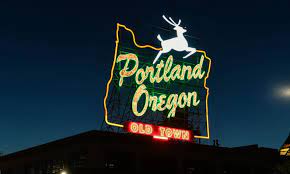Old Town Abyss (Part 1)
(What follows is a two-part story about my attempts to get one homeless man in Portland into housing. You can read more of my writing about the homeless on my Substack newsletter called The New American Diaspora at https://mattlove.substack.com/ The newsletter is free to read but also accepts donations to support the work.)
I pulled my car alongside the sidewalk. Mark, Donny and Jacob were sitting there talking. I yelled hello out the window and the crew waved and said hello back.
It was 10:15 on a Wednesday morning. The sun was out. Mark was 15 minutes early for our appointment to drive downtown and I took his readiness as a positive sign. I parked my car in the convenience store parking lot and walked up to Mark. He was smoking a clove and malt liquoring for breakfast.
Mark asked if he could finish his beer and clove before we headed out. He looked nervous. I said sure.
Donny told Mark to give him the beer and clove and get on with the trip. Matt was ready to go. So go. Jacob gave Mark a quasi pep talk. They both knew where Mark was going and that he wanted off the streets. It was like Jacob and Donny were sending him off to college for his freshman year. And if it worked out for Mark, maybe it could work for them. They were probably thinking the same thing.
Mark finished the beer and clove. He stood up and wobbled a bit. He followed me to the car. Donny and Jacob wished him luck.
On the drive downtown, Mark quoted Robert Louis Stevenson (I don’t recall the line) and expounded on his current philosophy of life. He talked about appreciation and never being bored. He talked about having the right Zen state of mind for change. He slurred here and there but I followed his gist.
I knew the general area where our destination, Central City Concern’s Transition Projects, was located, in the Old Town district near the former bus station. I had a long history with Old Town, a good one, with many memorable stories of seeing bands such as Nirvana and Dead Moon at the legendary rock club Satyricon in the 80s and 90s, whiskey sours in the Chinese dive bar Hung Far Low, Saturday Market, art galleries, taking my students on field trips to Powell’s City of Books and visiting the Japanese American Historical Plaza at Waterfront Park and considering the horrendous decision by FDR to inter Japanese-American citizens in concentration camps during WW II, many of them from Oregon.
But the Old Town I had known and loved was long, long gone, devastated by homelessness. I knew that from news reports and images on television and the internet but I had yet to see it first hand. I was bracing myself for the carnage.
Mark knew exactly where to go because he’d visited there before trying to solve various internet problems related to his homelessness.
As we neared the Burnside Bridge to cross over the Willamette River and into Old Town, I asked Mark how he had become homeless. It was something I’d wanted to know since our first meeting. Now was the time because we were distraction-free from the typical zaniness of the sidewalk.
Mark’s story:
His mother died in 2016 and the loss ripped him apart. He was in his late 40s and sharing an apartment in East Portland with his girlfriend. They split the $700 a month rent and utilities. She liked to gamble and drink. He liked to drink. Mark was working as a framer for a construction company and earning $17 an hour. He discovered his girlfriend was having an affair with his best friend and she moved out. Mark got fired for drinking on the job and after a while, could no longer afford the apartment. He used his tax return for a bus ticket to Missouri to visit his daughter and grandchildren. He thought he might be able to stay with her for a spell, get a job, get back on his feet, and help out with his family. His daughter’s husband was a public defender and when he learned Mark had violated his probation (for an offense I didn’t ask about) by traveling out of state, he said Mark couldn’t stay. Mark returned to Portland and ended up sleeping on a cot in a barracks-like shelter until he was kicked out for drinking. He met a woman and they decamped for a rural area east of Portland, in Clackamas County. That lasted for an indeterminate amount of time (Mark was hazy on chronology) until meth miscreants invaded the space and stole Mark’s phone and other possessions. He somehow found his way to the streets of Sellwood three years ago in 2019 and had survived the Pandemic, thick smoke from record forest fires, a record ice storm, a record heat dome, and colossal incompetence and indifference by officials, agencies and organizations tasked with addressing a homeless crisis in the Portland area that was just one small part of larger homeless crisis that had no parallel in American history. Mark had survived on income from canning, his $600-a-month food stamp allowance distributed via a debit card, and whatever cash locals might donate. He received no other government or non profit services.
It wasn’t the story I expected to hear, but then again I had never heard an origin story of homelessness told directly to me by someone who was homeless.
But who also didn’t want to be homeless anymore.

